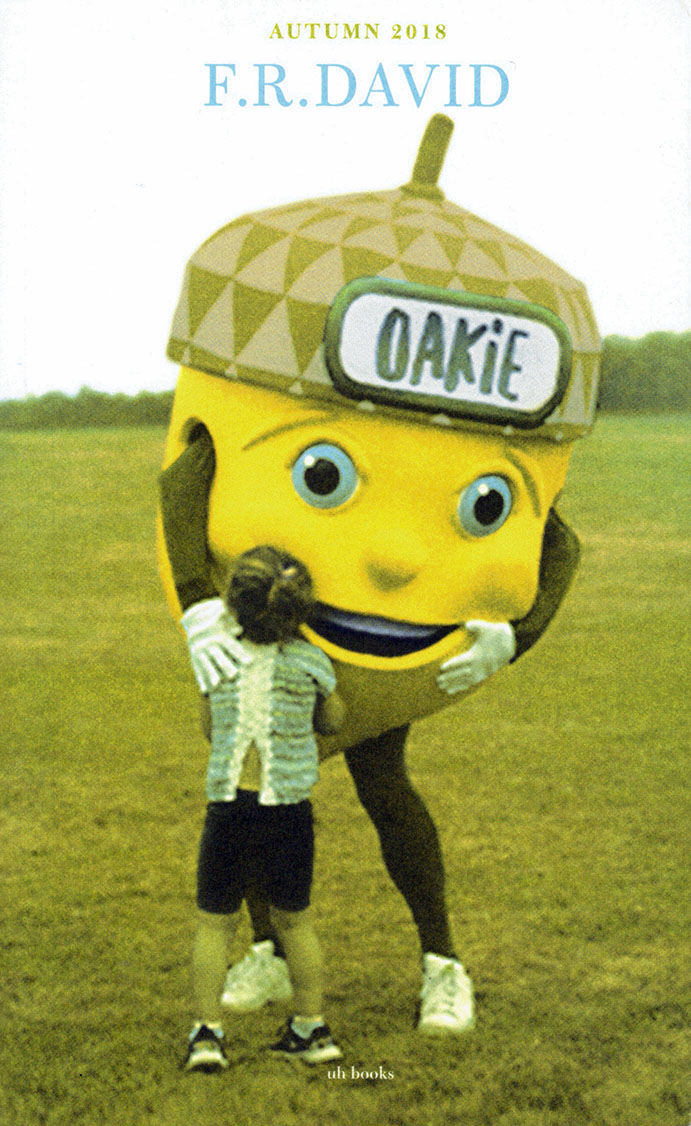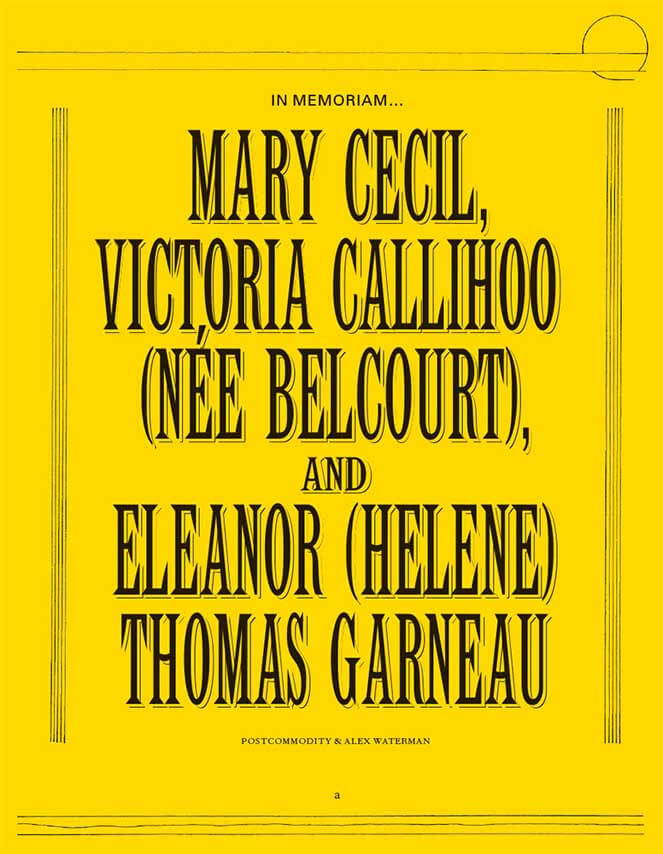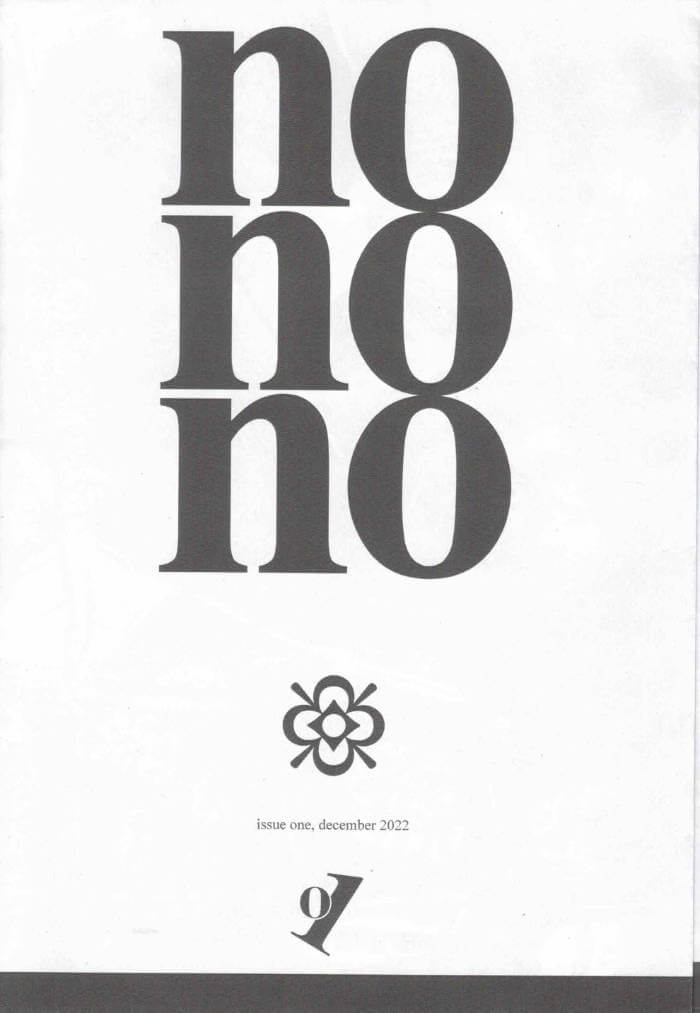
F.R. David - what I mean is—
Will Holder ed.
F.R.DAVID is a typographical journal, dealing with the organisation of reading and writing in contemporary art practises. “what I mean is—” the 16th issue, edited by Will Holder.

Will Holder ed.
F.R.DAVID is a typographical journal, dealing with the organisation of reading and writing in contemporary art practises. “what I mean is—” the 16th issue, edited by Will Holder.

Ociciwan Contemporary Art Collective
Eighty-page programme book score, and libretto, for performances by Indigenous musicians of in memoriam…Mary Cecil,Victoria Callihoo (née Belcourt), and Eleanor (Helene) Thomas Garneau and Robert Ashley’s in memoriam... Curated and edited by Ociciwan Contemporary Art Collective.
[from back cover] …in memoriam Mary Cecil,Victoria Callihoo (née Belcourt), and Eleanor (Helene) Thomas Garneau adds a new score and production by Postcommodity and Alex Waterman to a suite of four early scores by the American composer Robert Ashley. The fifth score honours the lives of Mary Cecil, Victoria Callihoo (née Belcourt), and Eleanor (Helene) Thomas Garneau, three Indigenous women from territory at the turn of the Century as it became the province of Alberta. This significant addition continues Ashley’s project investigating the connections between musical forms and constructs of historicization, opening a conversation regarding whom and how we memorialize individuals and inscribe their legacies.
[from essay by Candice Hopkins] What histories are remembered and who is doing the remembering? What form do these rememberings take? It is not as simple as taking down one monument and replacing it with another. We need to ask more questions, take note of the voids that stand in for the past, and actively make way for other voices, particularly those are trapped under the ‘sea ice of English’. “Listen for sounds”, writes the Tlingit poet and anthropologist Nora Marks Dauenhauer, “They are as important as voices. Listen. Listen. Listen. Listen.”

We begin with the image of an idea in ruin. A small field of assumptions disassembled. A question no longer in need of its mark. A thought not sure where it began. It starts from the body and language. The debris of these three words, crumbling already at and, did not break apart but congealed the separations once made. We start from a research (project) undone and just beginning.
Typesetting and design: Will Holder
Produced by: A.pass
Chloe Chignell works across choreography and publication taking the body as the central problem, question and location of the research. She invests in writing as a body building practice, examining the ways in which language makes us up.

Francesca Percival, Felix Rapp and 1 more
Le Chauffage (french for “The Heater”) is an artist-run publication based in Brussels and Vancouver. It is conceived as a cross-continental, community oriented platform. Le Chauffage brings together the work and writing of artists / friends from different cities with the intent to spark discussion and fuel casual forms of critical discourse.
The second issue of Le Chauffage contains photographs and texts, photographs of text, photographs as text and vice versa. Loosely thinking through the format of The Photo Essay celebrated by John Szarkowski in an eponymously titled exhibition at MoMA in 1965, this issue considers some of the artistic possibilities that can be found in such an archaic and historically male-dominated form.
Many of the contributions that make up this second issue are not photo essays per se. But each one of them considers the printed page as a space in its own right. The magazine becomes an interior where words and images entertain a malleable and distinctly porous relationship. At times, it is also a space where artists and writers from different cities were invited to meet and collaborate. And since interest in other people is also an interest in yourself, it is always unclear who is really transforming who?
Contributions by: Bob Cain & Linda Miller, Moyra Davey, Laurie Kang, Niklas Taleb, Madeleine Paré & Diane Severin Nguyen, Josephine Pryde, Slow Reading Club, Ken Lum, Isaac Thomas, Vijai Maia Patchineelam, Artun Alaska Arasli & Graeme Wahn, Stephen Waddell, Maya Beaudry & Chloe Chignell, Lisa Robertson, groana melendez, Victoria Antoinette Megens and Will Holder.
Editors: Emile Rubino and Felix Rapp
Co-Editor: Francesca Percival
Design: Francesca Percival and Felix Rapp
Cover Design: Francesca Percival
Printed by: Cassochrome, Belgium
Edition of 350

As an artist how can you get out of the hiding position? To make art is to understand how you are, notice your prejudices and assumptions about value and acknowledge your hand in an unequal world, to recognise how you institute yourself while letting go of the outcome of work.
Ghislaine Leung is a British conceptual artist. Her work uses score-based instructions to radically redistribute and constitute the terms of artistic production. For Leung, limitations, felt as personal, institutional, structural or systemic to the parameters of industry, are engaged in as means to institute differently. Born in Stockholm, Sweden to a father from Hong Kong and a mother from London, she was raised first in Reims, France and then in London, England. She received a BA Fine Art in Context at the University of the West of England in 2002 and a Masters in Aesthetics and Art Theory at the Centre for Research in Modern European Philosophy at Middlesex University in 2009. Between 2004 and 2014 she worked at Tate and LUX, London. Leung’s first book was Partners (Cell Project Space, 2018). She lives in London, UK.
978-1-9164250-0-2
21.6 x 13.9 cm
96 pp
Paperback
September 2023

published commonly, no no no expounds an experimental poetic offering, both text & art.
each issue features a limited edition artwork. which can be tacked or framed or stored in a drawer.
celestial in nature, no no no takes the form required, and necessary.

TIME by Spencer Longo is a collection of printed work depicting government raids, religious visions, environmental catastrophe, and extremist fundamentalism tangled together in a narrative web of salvation, annihilation, and transcendence. Using pen plotter graphics directly on uncollated pages of Time magazine, Longo explores the conspiratorial trope that messages are secretly embedded in mass media, coaxing our millenarian anxieties out through an additive printing process using graphics from survivalist publications, end-times evangelical cartoons, and marginalia from the borders of underground occult material, all sprinkled with ecstatic bursts of star-spangled clipart. A must-have for your fallout shelter's library.

Real state is the first publication by artist Asta Meldal Lynge, a visual essay with text by Eleanor Ivory Weber, that takes a critical stance towards the subjects of housing, urban development and image production. Employing video-stills, photographs and found images, Lynge explores the social and political value of the image, in a specifically urban context, emphasising the fictions present in the (re)production of space.
In particular, Real state investigates the ramifications of architectural renderings within the public sphere, documenting building site hoardings, symbolic points at the threshold of construction, where a yet-to-exist everyday and a predicted image of the city meets the real one.
Processing this documentation through layering, editing and retouching, Lynge highlights (and challenges) both the intensifying tendency of ‘image-building’ or the production of buildings as icons and the subsequent transformation of public space into an infinite extension of image surfaces.
As the content is framed and re-framed, trackpad gestures are overlaid, ultimately bringing the stability of any image surface into question. This destabilising approach is mirrored in Weber’s text which combines excerpts from e-mail conversations, with differing registers of fiction, expanding on the disconnection between the idea of housing as a basic human need and its position within market logic and neoliberal ideology.
The book’s title alludes to these systems at play, both the power structures of governed entities and the business of real estate; whilst troubling the promise that there is something real or true to be revealed.

Joëlle de La Casinière, Ana Jotta and 1 more
The moral tale is a literary genre that was especially popular in Europe throughout the 18th century. As ways of being and doing were strongly tied to conventions assigned to social roles and genres, the rise of rationality and freethought, characteristic of this era, began re-organizing the so-called “natural order” of established patterns. Through fables and satires, moral tales expressed sharp critical views on the social relationships and hierarchies of the time, often using radical irony and cruelty, as in the tales of Jonathan Swift or of the Marquis de Sade, to decipher the untold rules at play in this early age of capitalism.
The works of the three artists invited to these Three Moral Tales are not that of moralists, but somehow assume a kind of moral dimension, as they present themselves as critical allegories. Joëlle de La Casinière, Ana Jotta and Anne-Mie Van Kerckhoven make use of fables and sometimes caricatures to observe and criticize the cruelty of human relationships. The “moral tales” narrated by these three artists scrutinize representations of evil, and mock hierarchies, traditions and social order. By doing so, they also follow up on a certain spirit of the iconoclastic avant-gardes of the early 20th century.
French artist Joëlle de la Casinière, Portuguese Ana Jotta and Flemish Anne Mie Van Kerckhoven have in common to pay no fealty to trends of contemporary art. Moreover, they fought unwaveringly throughout their respective careers the need to see their work being given an “official line”. Instead, they stood aside, went underground or remained indifferent to the twists and turns of the art market and institutions. They sometimes created surrogate characters, hid, or playfully modified their names to react to the branding of identity in the artworld, and to the imposed marginalization that they had to cope with as women artists, as did artists living in peripheral geographies. In a way, paradoxically, being marginalized encouraged a calculated versatility of media and styles, and the invention of an idiosyncratic vocabulary, while total freedom remained their one and only rule.